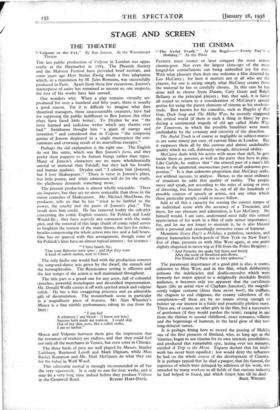STAGE AND SCREEN
THE THEATRE
"Volpone or the Fox." By Ben Jonson. At the Westminster Theatre
THE last public production of Volpone in London was appa- rently at the Haymarket in 1783. The Phoenix Society and the Malvern Festival have provided brief revivals, and some years ago Herr Stefan Zweig made a free adaptation which, in a translation by M. Jules Romains, was successfully produced in Paris. Apart from these few excursions, Jonson's masterpiece of satire has remained as unseen as, one suspects, the rest of his works have lain unread.
One wonders why. When a play remains virtually un- produced for over a hundred and fifty years, there is usually a good reason. Yet it is difficult to imagine what data theatrical managers, those unaccountable creatures, have had for supposing the public indifferent to Ben Jonson (his other plays have fared little better). To Dryden he was , " the most learned and judicious writer which any theatre ever had." Swinburne thought him " a giant of energy and invention " and considered that in Volpone "the composite genius of Jonson displayed in a single masterpiece the con-
summate-and crowning result of its marvellous energies."
Perhaps the old explanation is the right one. The English do not like satire, which was Ben Jonson's forte, and they prefer their puppets to be human beings rather than types. Many of Jonson's characters are no more wholeheartedly amoral or immoral than Falstaff, but they lack his lovable and human qualities. Dryden said " I admire him [Jonson], but I love Shakespeare." There is verse in Jonson's plays, but little poetry, and while admiration will do for the study, the playhouse demands something more.
The present production is almost wholly enjoyable. There are longueurs, but they are no more noticeable than those in the minor comedies of Shakespeare. Mr. Michael MacOwan, the producer, tells us that he has " tried to be faithful to the power, the cruelty 'and the gusto of Jonson's play." The result does him credit. He has removed bodily the sub-plot concerning the comic English tourists, Sir Politick and Lady Would-Be ; they have scarcely any connexion with the main plot, and the removal of this large chunk of comic relief serves to heighten the tension of the main theme, the lust for riches, besides compressing the whole action into two and a half hours. One has no quarrel with this arrangement, though some of Sir Politick's lines have an almost topical interest : for instance :
" I have heard, Sir,
That your Baboons were spies ; and that they were A kind of subtle nation, near to China."'
The only faults one would find with the production concern the song-and-dance acts given by the dwarf, the eunuch arid the hermaphrodite. The Renaissance setting is effective and
the fast tempo of the action is well maintained throughout.
The title part is a grand one for any actor, full of colourful speeches, powerful monologues and diversified impersonation. Mr. Donald Wolfit carries it off with spirited attack and vulpine relish. He has a fine swaggering presence and an admirable gift of dissimulation. The mountebank scene in particular is a magnificent piece of bravura. Me. Alan Wheatley's Mosca is a fine nimble performance, taking its cue from the lines :
" I can feel
A whimsey i' my blood : (I know not how) Success hath made me wanton. I could skip Out of my skin, now, like a subtil snake, I am so limber."
Mosca and Volpone between them give the impression that the resources of trickery are endless, and that they could fool not only all the merchants in Venice, but even some in Chicago.
The three birds of prey are well played by Messrs. Stanley Lathbury, Raymond Lovell and Mark Dignam, while Miss Rachel Kempson and Mr. Niall McGinnis do what they can for the babes in Wolf Wood.
This admirable revival is strongly recommended to all but the very squeamish. It is only to run for four weeks, and it may be a very long time indeed before they produce Volpone


















































 Previous page
Previous page